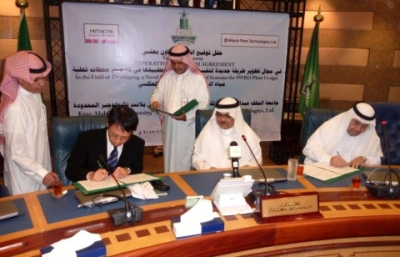Dec 21 2012
On November 14, Hitachi Ltd. and Hitachi Plant Technologies, Ltd. signed an agreement with the Kingdom of Saudi Arabia's King Abdulaziz University (KAU) (President, Prof. Osama S. Tayek) for joint research on water quality monitoring technology to be used in seawater desalination facilities.
 Joint research agreement signing ceremony (Seated: Professor Osama S. Tayek, President of KAU (center), Dr. Koichi Tsuzuki, Vice President and Executive Officer, Hitachi Plant Technologies (left), and Professor Adnan Hamza M. Zahed, KAU Vice President for Postgraduate Studies and Scientific Research (right))(Photo: Business Wire)
Joint research agreement signing ceremony (Seated: Professor Osama S. Tayek, President of KAU (center), Dr. Koichi Tsuzuki, Vice President and Executive Officer, Hitachi Plant Technologies (left), and Professor Adnan Hamza M. Zahed, KAU Vice President for Postgraduate Studies and Scientific Research (right))(Photo: Business Wire)
The joint research will focus on the demonstration and validation, evaluation, and improvement of water quality monitoring technology developed at Hitachi's Yokohama Research Laboratory (Yokohama, Kanagawa, Japan) that will be used in Hitachi Plant Technologies' seawater desalination plant. This work will be conducted over a nearly two-year period in cooperation with KAU's Center of Excellence in Desalination Technology (Executive Director Dr. Mohammed H. Albeirutty; hereinafter "CEDT"), which is one of the most experienced organizations in this field in Saudi Arabia, one of the world's most important markets for seawater desalination plants.
Seawater reverse osmosis plants based on reverse osmosis (RO) membranes are widely used to obtain potable water and industrial water in regions such as the Middle East, which have a serious shortage of water resource. An important task in operating the Seawater reverse osmosis plants is preventing membrane fouling caused by the foulants included in the seawater. An accurate assessment of seawater properties based on its monitoring is essential for controlling fouling and ensuring stable operation of the plants because the operating parameters must be set in view of these properties.
The water quality monitoring technology developed at Hitachi's Yokohama Research Laboratory measures the very small amount of substances in seawater that cause RO membrane fouling using the quartz crystal microbalance method (QCM method). The QCM method measures the mass of minute quantities of substances adhering to a quartz oscillator by detecting changes in the oscillator's natural frequency induced by the mass increase. This approach has already been developed for film thickness sensors used in semiconductor production equipment and other applications. Hitachi and Hitachi Plant Technologies have studied the relationship between RO membrane fouling and water quality monitoring data using the QCM method with view to controlling operations for minimize fouling and optimizing the cleaning and replacement intervals of RO membranes. Using actual seawater from the Red Sea, the joint research with KAU's CEDT will demonstrate the performance of this system and accelerate its commercialization. The Hitachi Group plans to use the results of the joint research to expand business in engineering, procurement, and construction (EPC) of seawater desalinization plants and their operation and management business.
At the signing ceremony held on November 14 at KAU in Saudi Arabia, CEDT Executive Manager Dr. Mohammed H. Albeirutty expressed his hopes for the project, saying, "This project is an opportunity to blaze a new trail in seawater desalinization plants by leveraging the advanced technology of Hitachi and Hitachi Plant Technologies." Dr. Koichi Tsuzuki, Vice President and Executive Officer of Hitachi Plant Technologies, echoed Dr. Albeirutty's sentiment, saying, "It is our hope that Hitachi's technologies, not limited to the fruits of this joint research project, will contribute to the further development of Saudi Arabia." Hitachi and Hitachi Plant Technologies will continue to hold discussions with KAU on expanding their areas of cooperation.
In recent years, the Hitachi Group has strengthened its presence in Saudi Arabia. In October 2009, Hitachi opened a branch in the Saudi capital of Riyadh to serve as a base for its operations. Hitachi Plant Technologies became the first Japanese company to sign a corporate procurement agreement (CPA) to supply and service compressors for oil-and-gas plants with the Saudi Arabian Oil Company (Saudi Aramco) in June 2011 and in June 2012, established Hitachi Saihati Engineering Services Co., Ltd. to provide industrial equipment maintenance services. In January 2013, Hitachi Plant Saudi Arabia Co., Ltd. (provisional name) will be established as a joint venture with the El Seif Group to provide social and industrial infrastructure construction and engineering business. The Hitachi Group considers this joint research agreement with KAU as an important milestone in building-up ties with Saudi Arabian research organizations for providing solutions to regional needs through locally-led initiatives research and development.